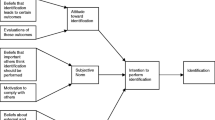Abstract
The purpose of this study is to investigate the salient beliefs customers hold towards the education service sector in Australian. This paper uses the Theory of Planned Behaviour as a qualitative framework to enable a more systematic analysis of school choice in Australia. Results indicate that (1) proximity of school and academic reasons were the main salient beliefs among parents, and (2) the Theory of Planned Behaviour provided a more structured method for elicitation as compared to previous studies that did not used any established behavioural theoretical frameworks.

Similar content being viewed by others
References
Ajzen I (1991) The theory of planned behaviour. Organ Behav Hum Decis Process 50:179–211. doi:10.1016/0749-5978(91) 90020-T
Ajzen I, Fishbein M (1980) Understanding attitudes and predicting social behaviour. Prentice Hall, Englewood Cliffs, NJ
Armitage CJ, Conner M (2001) Efficacy of the theory of planned behaviour: a meta analytic review. Br J Soc Psychol 40:471–499. doi:10.1348/014466601164939
Australian Bureau of Statistics (2004) Schools, Australia, Cat. No. 4221.0, ABS, Canberra
Bagley C (1996) Black and white unite or flight? The racialised dimension of schooling and parental choice. Br Educ Res J 22(5):569–580. doi:10.1080/0141192960220504
Bussell H (1997) Choosing a Primary School: The impact of social class on consumer behaviour. Proceedings of the 1997 Annual Conference of AMA (MEG), Manchester Metropolitan University
Bussell H (1998) Parental choice of primary school: an application of Q-methodology. Serv Industries J 18(3):135–147. doi:10.1080/02642069800000036
Churchill G (1998) Measurement in marketing: time to refocus? In: Hess JD, Monroe KB (eds) Proceedings of the 14th Paul D. Converse Symposium. American Marketing Association, Chicago, pp 25–41
Denessen E, Driessena G, Sleegers P (2005) Segregation by choice? A study of group–specific reasons for school choice. J Educ Policy 20(3):347–368. doi:10.1080/02680930500108981
Elacqua G, Gobierno E, Ibanez, U (2005) School choice in Chile: An analysis of parental preferences and search behaviour. National centre for the study of privatization in education, pp 1–35
Godin G, Kok G (1996) The theory of planned behaviour: a review of its applications to health related behaviours. Am J Health Promot 11:89–98. doi:10.1093/heapro/11.2.89
Goldring E, Hausman C (1999) Reasons for parental choice of urban schools. J Educ Policy 14(5):469–490. doi:10.1080/026809399286161
Gorard S (1997) A choice of methods: the methodology of choice. Res Educ 57:45–56
Jackson C, Bisset M (2005) Gender and school choice: factors influencing parents when choosing single sex or co educational independent schools for their children. Camb J Educ 35(2):195–211. doi:10.1080/03057640500146856
Kelley J, Evans M (2004) Choice between government, Catholic and independent schools-culture and community rather than class. Aust Soc Monit 7(2):31–42
Kleitz B, Weiher G, Tedin K, Matland R (2000) Choice, charter schools and household preferences. Soc Sci Q 81(3):846–852
Maddala G (1992) Introduction to Econometrics. Macmillan, New York
Oppenheim A (1992) Questionnaire design, interviewing and attitude measurement. Pinter, London
Schneider M, Buckley J (2002) What do parents want from schools? Evidence from the internet. Educ Eval Policy Anal 24(2):133–144. doi:10.3102/01623737024002133
Smedley D (1995) Marketing secondary schools to parents—some lessons from the research on parental choice. Educ Manage Adm 23(2):96–103
Smith R, Olah D, Hansen B, Cumbo D (2003) The effect of questionnaire length on participant response rate: a case study in the U.S. cabinet industry. For Prod J 53(11/12):33–36
Sutton S (1998) Predicting and explaining intentions and behaviour: How well are we doing? J Appl Soc Psychol 28(15):1317–1338. doi:10.1111/j.1559-1816.1998.tb01679.x
West A, David M, Hailes J, Ribbens J (1995) Parents and the process of choosing secondary schools: implications for schools. Educ Manage Adm 23(1):28–38
Author information
Authors and Affiliations
Corresponding author
Rights and permissions
About this article
Cite this article
Goh, E. Public education and parents: eliciting salient beliefs using the theory of planned behaviour as a qualitative research framework. Int Rev Public Nonprofit Mark 6, 99–108 (2009). https://doi.org/10.1007/s12208-009-0024-y
Received:
Accepted:
Published:
Issue Date:
DOI: https://doi.org/10.1007/s12208-009-0024-y




